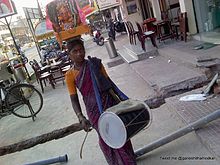- Nomadic tribes in India
-
 A nomad lady in Maharashtra
A nomad lady in Maharashtra
The word Nomadic Tribes refers to the people who were forced to live a wandering life by the Indian Caste System. The Nomadic and Denotified Tribes consist of about 60 million in India, out of which about five million lives in Maharashtra. There are 313 Nomadic Tribes and 198 Denotified Tribes.
Due to wandering traditions of over hundreds of years without any good means of life under the influence of caste system, they are forced to live under sub human conditions. The large section of this tribes is known as vimukta jatis or 'ex-criminal castes' because they were branded as criminals by birth under the act Criminal Tribes Act 1871, enacted by British rule in India.
After independence of India, this act was repealed by Government of India in 1952. In Maharashtra, they have been not been included in the list of Scheduled Tribes because of some historical circumstances, but are listed as Scheduled Castes or "Nomadic Tribes".[1] The tribes designated as "Denotified", "Nomadic" or "Semi-Nomadic" are eligible for reservation in India.[2][3]
See also
- Denotified tribes of India
- Nomadic peoples of Europe
- Rajasthani people
References
- ^ Motiraj Rathod, Denotified and Nomadic Tribes in Maharashtra
- ^ Neelabh Mishra (2008-10-06). "A Little Carvanserai". Outlook 48 (40): 14.
- ^ List of Castes - Maharashtra State
External links
- National Commission for denotified, Nomadic & Semi-nomadic Tribes, Official website Ministry of Social Justice and Empowerment
- "Jaisalmer Ayo! Gateway of the Gypsies" sheds light on the lifestyle, culture and politics of nomadic life in Rajasthan as it follows
a group of snake charmers, storytellers, musicians, artists and blacksmiths as they make their way across the Thar Desert to Jaisalmer.
Categories:- Ethnic groups in India
- Indian law
- Asian law stubs
- Indian government stubs
- Indian ethnic group stubs
Wikimedia Foundation. 2010.
